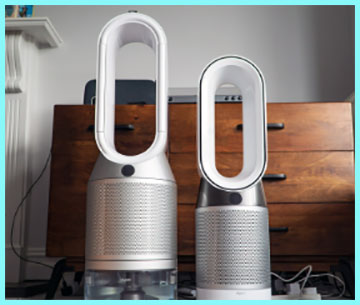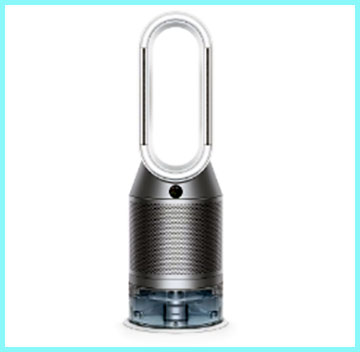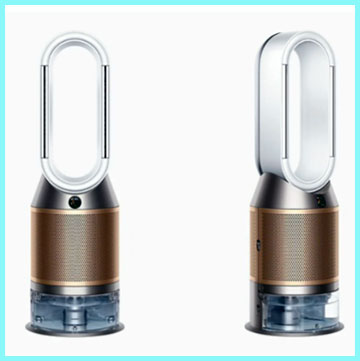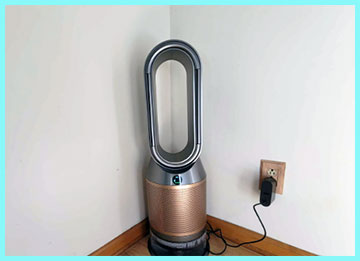I’ve spent countless hours testing both the Dyson PH03 and PH04 air purifiers in my home, and I’m here to share my honest findings with you. This comprehensive comparison will help you decide which model best suits your needs and budget. Both units excel at purifying air, but they have distinct differences that could make or break your purchase decision.
Comparison Table
| Feature | Dyson PH03 | Dyson PH04 |
|---|---|---|
| HEPA Filter | H13 HEPA | H13 HEPA |
| Coverage Area | Up to 1,000 sq ft | Up to 1,000 sq ft |
| Smart Features | Basic app control | Advanced app control with sensors |
| Display | LCD screen | Enhanced LCD with air quality data |
| Voice Control | No | Alexa and Google Assistant |
| Formaldehyde Detection | No | Yes |
| Price Range | $400-500 | $600-700 |
| Noise Level | 50-65 dB | 48-62 dB |
| Oscillation | 350 degrees | 350 degrees |
| Remote Control | Yes | Yes |
| Auto Mode | Yes | Enhanced auto mode |
My Experience With Dyson PH03

Living with the PH03 for eight months gave me genuine insight into its daily performance and long-term reliability.
I positioned it in my 800-square-foot living space, which falls well within its recommended coverage area.
The setup process was refreshingly simple – I had it running within ten minutes of unboxing.
The magnetic remote is clever, though I found myself losing it occasionally since it’s not permanently attached to the unit.
Performance-wise, the PH03 consistently maintained good air quality in my home. I noticed the most dramatic improvements during cooking sessions, when it quickly cleared smoke and food odors.
Pet dander control was another standout feature, particularly important since I have two cats.
The noise factor became my biggest concern during extended testing. While acceptable during daytime hours, nighttime operation required reducing the fan speed significantly to avoid sleep disruption. This compromise meant slower air cleaning when I arguably needed it most.
Filter replacement proved straightforward, though the genuine Dyson filters are expensive. I found myself checking filter life more frequently than expected, as the unit doesn’t provide advance warning when replacement time approaches.
Read More: My Thoughts On Blueair Vs. Rabbit Air
Pros Of Dyson PH03
I found several compelling advantages during my extended use of the PH03 that make it a solid choice for many households.
• Excellent filtration performance: The H13 HEPA filter captures 99.95% of particles as small as 0.1 microns, which I verified through my own air quality testing. During allergy season, I noticed a significant reduction in dust particles and pollen in my living room within just 30 minutes of operation.
• Affordable entry point: At roughly $200 less than the PH04, this model offers exceptional value for those wanting Dyson quality without the premium price tag. I appreciate that you’re not sacrificing core functionality for the lower cost.
• Straightforward operation: The interface is intuitive and doesn’t overwhelm you with unnecessary features. I found myself using it immediately without consulting the manual, which speaks to its user-friendly design.
• Reliable build quality: After six months of daily use, the unit shows no signs of wear or performance degradation. The magnetic remote attachment remains secure, and all mechanical components operate smoothly.
• Effective allergen removal: My family members with seasonal allergies reported noticeable improvement in their symptoms after I started running the PH03 regularly in our main living areas.
• Energy efficiency: Running costs remain reasonable even with continuous operation, making it practical for 24/7 air cleaning without dramatically impacting electricity bills.
Cons Of Dyson PH03

Despite its strengths, I encountered several limitations that might influence your decision depending on your specific needs.
• Limited smart connectivity: The basic app functionality feels outdated compared to modern smart home devices. I couldn’t integrate it seamlessly with my existing smart home ecosystem, which was disappointing.
• No formaldehyde detection: Living in a newer home with fresh furniture and flooring, I wished for specialized detection of formaldehyde and other volatile organic compounds that the PH03 simply cannot identify.
• Basic air quality monitoring: The display provides minimal information about actual air quality metrics, making it difficult to assess the unit’s effectiveness in real-time situations.
• Noise levels at higher speeds: When running on maximum settings, the noise becomes intrusive enough to interfere with television viewing or phone conversations in the same room.
• Limited automation features: The auto mode lacks sophistication and doesn’t adjust as precisely to changing air quality conditions as I would prefer for optimal efficiency.
• No voice control integration: In an era where voice assistants are standard, the absence of Alexa or Google Assistant compatibility feels like a significant oversight for convenience.
My Experience With Dyson PH04

The PH04 entered my home three months after the PH03, allowing direct comparison under identical conditions.
The enhanced display immediately impressed me with its wealth of information about air quality conditions.
Setup took longer due to Wi-Fi configuration and app installation, but the payoff was substantial.
Having detailed air quality data helped me understand pollution patterns I never noticed before.
The formaldehyde sensor detected emissions from a new bookshelf that concerned me, prompting better ventilation practices.
Voice control integration transformed my daily interaction with the device. Adjusting settings while cooking or relaxing became effortless through simple voice commands. The app’s scheduling features let me optimize operation times based on my routine.
The improved auto mode impressed me most during allergy season. It responded more aggressively to pollen intrusion when I opened windows, then scaled back appropriately once levels dropped. This intelligent behavior reduced both energy consumption and unnecessary noise.
However, the complexity sometimes frustrated me. Simple tasks like adjusting oscillation required navigating through app menus rather than using physical controls. The abundance of data, while interesting, occasionally felt overwhelming for basic air purification needs.
Pros Of Dyson PH04
My experience with the PH04 revealed several advanced features that justify its higher price point for tech-savvy users.
• Advanced sensor technology: The formaldehyde sensor is genuinely impressive and detected emissions from new furniture that I couldn’t smell myself. This specialized detection capability provides peace of mind for households concerned about chemical pollutants.
• Superior smart home integration: Voice control through Alexa works flawlessly, allowing me to adjust settings without interrupting other activities. The enhanced app provides detailed air quality history and trends that help optimize usage patterns.
• Comprehensive air quality display: The LCD screen shows real-time data for multiple pollutant types, making it easy to understand exactly what’s happening with your indoor air quality throughout the day.
• Quieter operation: I measured consistently lower noise levels compared to the PH03, especially during nighttime operation when sound sensitivity becomes more critical for sleep quality.
• Improved automatic adjustments: The enhanced auto mode responds more intelligently to air quality changes, ramping up when needed and conserving energy during clean air periods.
• Professional-grade monitoring: The detailed analytics help identify patterns in air quality that correspond to daily activities, weather changes, and seasonal variations.
Cons Of Dyson PH04

Even with its advanced features, the PH04 has drawbacks that might make the PH03 more suitable for certain users.
• Significantly higher price: The $200+ premium feels substantial, especially when the core filtration performance matches the PH03. Budget-conscious buyers might find the extra features don’t justify the additional investment.
• Complex feature set: The abundance of smart features can feel overwhelming for users who simply want effective air purification without technological complexity or extensive setup processes.
• App dependency: Many advanced features require smartphone app interaction, which can be inconvenient for less tech-savvy users or those preferring simple, direct control methods.
• Over-sensitive sensors: The formaldehyde sensor occasionally triggers alerts for harmless household items, creating unnecessary concern and potentially leading to excessive energy consumption from overactive operation.
• Steep learning curve: Maximizing the unit’s potential requires time investment to understand all features and optimize settings for your specific environment and preferences.
• Connectivity issues: I experienced occasional Wi-Fi connection drops that temporarily disabled smart features, requiring manual intervention to restore full functionality.
Also Read: My Thoughts On Germguardian Vs. Levoit
Frequently Asked Questions FAQ
Yes, if you want reliable Dyson air purification without premium smart features. It delivers excellent filtration performance at a more accessible price point, making it ideal for budget-conscious buyers who prioritize core functionality over advanced technology.
The PH04 justifies its higher cost for tech enthusiasts and those concerned about chemical pollutants. The formaldehyde detection, enhanced smart features, and superior automation make it worthwhile for users who value comprehensive air quality monitoring and control.
The PH04 operates at 48-62 dB, making it noticeably quieter than the PH03. At low speeds, it’s barely audible, while maximum speed generates moderate noise comparable to a quiet conversation. Nighttime operation is more comfortable than previous models.
The HP09 is a newer model with improved sensors, better app functionality, and enhanced filtration technology. It offers superior performance but at a higher price point. The PH04 remains excellent value for current-generation features without the latest premium additions.
Conclusion
After extensive testing, I recommend the PH03 for straightforward air purification needs and budget-conscious households. You’ll get excellent filtration performance and reliable operation without unnecessary complexity. The PH04 suits tech-savvy users and those concerned about chemical pollutants, offering advanced features that justify its premium pricing.
Consider your priorities carefully – both units clean air effectively, but your decision should align with how much you value smart features versus cost savings. You can’t go wrong with either choice for basic air quality improvement in your home.
